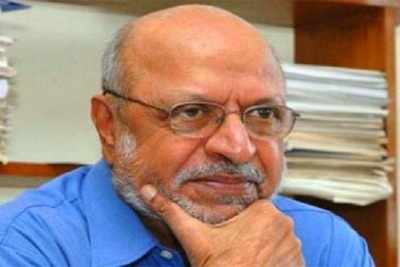- News
- entertainment
- hindi
- bollywood
- 'No cuts by censors' recommendation by Shyam Benegal won't help film industry much
Trending
This story is from April 28, 2016
'No cuts by censors' recommendation by Shyam Benegal won't help film industry much
The recommendation of the Shyam Benegal committee that the Central Board of Film Certification (CBFC) should not impose cuts in films has been welcomed by the film industry. But if the authorities feel the content is against 'decency and morality', the film can be refused certification.

The recommendation of the Shyam Benegal committee that the Central Board of Film Certification (CBFC) should not impose cuts in films has been welcomed by the film industry. For several years, the film industry has been complaining about the CBFC playing spoilsport and getting scenes chopped off citing censorship rules.
With the Shyam Benegal committee understanding the woes of the film industry and making the recommendation to the union ministry of information and broadcasting, the film industry is now in an upbeat mood.
Shyam Benegal: Abolish censorship
What, however, has come as a dampener is that the committee has reiterated that the CBFC can refuse to certify a film if the content goes against the Section 5B (1) of the Cinematograph Act, 1952.
However, it has a problem with the provision that if the authorities feel the content is against 'decency and morality', the film can be refused certification.
'The Shyam Benegal committee's recommendation that CBFC should not impose cuts in films is something that the film industry has been asking for a long time. The committee has understood the needs of the film industry. But the problem, as we see now, is that it will be left to the advisory panel members to decide what is 'decency and morality' as it is happening now. So the freedom that the committee is giving the film industry cannot be utilized if someone in the advisory panel objects to the content and refuses to give certification,' said Supran Sen, secretary general of Film Federation of India.
Supran Sen also wanted to know that the government had done about the recommendations that had been made by the Mudgal committee three years ago. 'There has been a delay in acting on that report which also made several recommendations that would have benefitted the film industry,' he pointed out.
A P Film Chamber of Commerce president D Suresh Babu told TOI that the committee's recommendation on 'no cuts' were most certainly a welcome thing. 'This is good news for the film industry. But we now have to watch and wait to see if the recommendations will be accepted and implemented,' he said.
Producers are also appreciative of the Shyam Benegal committee understanding the needs of the film industry. 'The committee's recommendations will benefit the industry. The most important thing is that there should be a uniform definition of what is 'obscenity and morality' to be followed by all regional offices of the CBFC,' said Kodali Venkateshwara Rao of the Telugu Film Producers Council (TFPC).
WATCH: Shyam Benegal Cinema focuses on entertainment, later education'
With the Shyam Benegal committee understanding the woes of the film industry and making the recommendation to the union ministry of information and broadcasting, the film industry is now in an upbeat mood.
Shyam Benegal: Abolish censorship
What, however, has come as a dampener is that the committee has reiterated that the CBFC can refuse to certify a film if the content goes against the Section 5B (1) of the Cinematograph Act, 1952.
Under this section, the authorities can refuse to certify a film if it goes against the interests of the sovereignty and integrity of the country. The film industry has no problem with this provision.
However, it has a problem with the provision that if the authorities feel the content is against 'decency and morality', the film can be refused certification.
'The Shyam Benegal committee's recommendation that CBFC should not impose cuts in films is something that the film industry has been asking for a long time. The committee has understood the needs of the film industry. But the problem, as we see now, is that it will be left to the advisory panel members to decide what is 'decency and morality' as it is happening now. So the freedom that the committee is giving the film industry cannot be utilized if someone in the advisory panel objects to the content and refuses to give certification,' said Supran Sen, secretary general of Film Federation of India.
Supran Sen also wanted to know that the government had done about the recommendations that had been made by the Mudgal committee three years ago. 'There has been a delay in acting on that report which also made several recommendations that would have benefitted the film industry,' he pointed out.
A P Film Chamber of Commerce president D Suresh Babu told TOI that the committee's recommendation on 'no cuts' were most certainly a welcome thing. 'This is good news for the film industry. But we now have to watch and wait to see if the recommendations will be accepted and implemented,' he said.
Producers are also appreciative of the Shyam Benegal committee understanding the needs of the film industry. 'The committee's recommendations will benefit the industry. The most important thing is that there should be a uniform definition of what is 'obscenity and morality' to be followed by all regional offices of the CBFC,' said Kodali Venkateshwara Rao of the Telugu Film Producers Council (TFPC).
WATCH: Shyam Benegal Cinema focuses on entertainment, later education'
End of Article
FOLLOW US ON SOCIAL MEDIA









